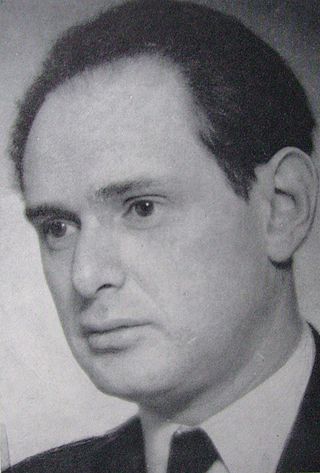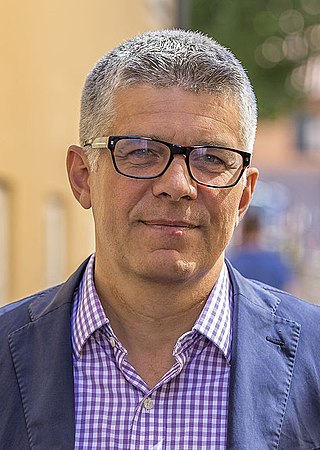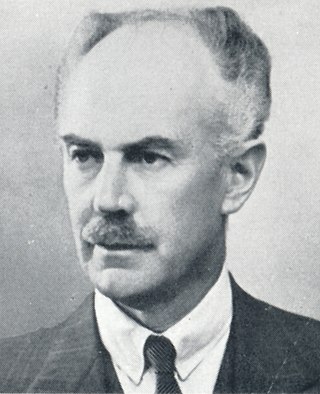Related Research Articles

Eli Filip Heckscher was a Swedish political economist and economic historian.

Knut Hjalmar Leonard Hammarskjöld was a Swedish politician, scholar, cabinet minister, Member of Parliament from 1923 to 1938, and Prime Minister of Sweden from 1914 to 1917.

Gunnar Edvard Heckscher was a Swedish political scientist and leader of the Rightist Party, which later became the Moderate Party.
Sten John Gustaf Rudholm was a Swedish lawyer, member of the Swedish Academy, former Chancellor of Justice, Chief Justice of Appeal and Marshal of the Realm. Rudholm was prior to his death the only living Swedish non-royal to have been made Knight of the Royal Order of the Seraphim – the foremost order of Sweden.

Lars Göran Tomas Lambertz was the Chancellor of Justice in Sweden between 2001 and 2009. He was serving as a judge on the Supreme Court of Sweden between 2009 and 2017.

The judicial system of Sweden consists of the law of Sweden and a number of government agencies tasked with upholding security and rule of law within the country. The activities of these agencies include police and law enforcement, prosecution, courts, and prisons and other correctional services.

The Supreme Administrative Court of Sweden is the supreme court and the third and final tier for administrative court cases in Sweden, and is located in Stockholm. It has a parallel status to that of the Supreme Court of Sweden, which is the supreme court for criminal and civil law cases.

The National Police Commissioner of Sweden is the head of the Swedish Police Authority, appointed by the Government, responsible for all activities of the police. The current Commissioner is Anders Thornberg, who began serving February 15, 2018.
Helena Jäderblom is a Swedish jurist and civil servant. From 2012 to 2018, she was a judge at the European Court of Human Rights. Since 2018, Jäderblom is president of Sweden's Supreme Administrative Court.
Sten Gustaf Wickbom was a Swedish civil servant and member of the Swedish Social Democratic Party. Wickbom served as the minister for justice from 1983 to 1987. He then became the Governor of Kronoberg County from 1988 to 1995.
Count Axel Charles Emil Lewenhaupt was a Swedish diplomat and Grand Master of Ceremonies at the Royal Court of Sweden.
Sven Håkan Winberg was a Swedish politician. He served as a member of the Riksdag from 1971 to 1982 for the Moderate Party. He was also Minister of Justice from 1979 to 1981.
Anders Bror Eka is a Swedish lawyer. Since 2013, he is a Justice of the Supreme Court. In 2018, he was appointed President of the Supreme Court.
Holger Axel Gustaf Romander was a Swedish civil servant. He served as the Prosecutor-General of Sweden from 1966 to 1978 and as the National Police Commissioner from 1978 to 1987.
Karl Gustaf Magnus Sjöberg is a Swedish jurist. He served as the Prosecutor-General of Sweden from 1978 to 1989 and as President of the Supreme Administrative Court of Sweden from 1990 to 1994.

Torsten Karl Viktor Nothin was a Swedish official and social democratic politician. He was Minister for Justice from 1924 to 1926 and Governor of Stockholm from 1933 to 1949.
The Ministry of the Interior was a ministry in Sweden established in 1947. The department dealt with matters concerning general health and medical care, the police service, the fire service, and the local government. The ministry was headed by the minister of the interior. At the end of 1973, the Ministry of the Interior ceased to exist and the activities were taken over by other ministries, such as the Ministry of Employment and the Ministry of Housing. In 1996, the former Ministry for Civil Service Affairs changed its name to the Ministry of the Interior and was called that until 1998, when the ministry ceased.
Carl Gunnar Lidbom was a Swedish jurist. He served as Minister of Commerce and Industry from 1975 and 1976 and as Ambassador of Sweden to France from 1982 to 1992. During his time in the Government Offices, he worked, among other things, on drafting a new Swedish constitution, which transformed the Riksdag from a bicameral legislature into a unicameral one.
Vice Admiral Hans Viktor Simonsson was a senior Swedish Navy officer. He served as head of the Military Office of the Naval Defence (1933–1938) and as Commanding Admiral of the South Coast Naval District (1938–1942) and of the East Coast Naval District (1942–1945). Simonsson was one of the founders of the Swedish Submarine Service.

Birger Ekeberg (1880–1968) was a Swedish jurist and legal scholar. He served as justice minister of Sweden, and during his tenure the Swedish Parliament abolished the death penalty on 7 May 1921.
References
- ↑ "Heckscher, Sten, född 1942" (in Swedish). Supreme Administrative Court of Sweden. 13 May 2008. Archived from the original on 16 January 2009.
- 1 2 3 4 Salander Mortensen, Jill, ed. (1996). Vem är det: svensk biografisk handbok. 1997 [Who is it: Swedish biographical handbook. 1997] (in Swedish). Stockholm: Norstedt. p. 454. ISBN 91-1-960852-7. SELIBR 3681533.